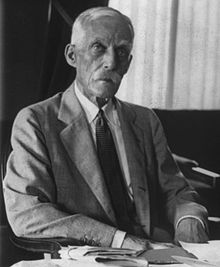Andrew W. Mellon
Andrew William Mellon (born March 24, 1855 in Pittsburgh , Pennsylvania , † August 27, 1937 in Southampton , New York ) was an American banker, politician and philanthropist . He was Treasury Secretary of the United States from March 4, 1921 to February 12, 1932 .
Life
His father Thomas Mellon founded a bank in Pittsburgh in 1869, which he expanded with his two sons Andrew W. Mellon and Richard B. Mellon as T. Mellon & Son's Bank . In 1886 Andrew W. Mellon took over the management of the bank. He started investing in railways, coal, and steel. From 1902 the bank was named Mellon National Bank. The company merged in 1946 with the Union Trust Company, also founded by Andrew Mellon, to form the Mellon National Bank and Trust Company, with assets of more than one billion US dollars. This later became the financial group Mellon Financial, since 2006 Bank of New York Mellon .
During World War I, Mellon was a fundraiser for the American Red Cross . President Warren G. Harding appointed Mellon to his cabinet after his election in 1921 , and he left the bank. He also remained Treasury Secretary under successive Presidents Calvin Coolidge and Herbert Hoover . In this capacity, he negotiated a foundation agreement with the French ambassador in Washington, Henry Bérenger , on the repayment of the inter-allied war debts , which France had refused since 1918 on the grounds that Germany first had to meet its reparation obligations from the First World War. In 1930 he installed the Federal Bureau of Narcotics (FBN) as an independent authority, which up to that point was a sub-authority of his own ministry. The husband of his niece Harry J. Anslinger was installed as the first head of the FBN . Even before Hoover lost his election in 1932 during the Great Depression , Mellon resigned and went to Great Britain as the United States Ambassador . However, he only stayed in this post for a year and then retired into private life.
philanthropy



Mellon was very important as an art collector. In the 1920s he acquired a. a. Masterpieces by van Eyck, Botticelli and Tizian from the Leningrad Hermitage . He initiated the founding of the National Gallery of Art in Washington and donated the foundation for its building and collection; his collection has also been there since 1941.
The Andrew W. Mellon Foundation is named after Mellon . It was created in 1969 through the merger of two foundations founded by Mellon's children, Ailsa Mellon Bruce and Paul Mellon , and is primarily active in the fields of science and art.
Mellon had been a member of the Freemasons Association since 1928 .
family
Andrew Mellon married Nora McMullen (1879–1973) from England in 1900, who was 24 years his junior. This marriage had two children: Alisa (1901–1969) and Paul (1907–1999). After the marriage ended in divorce in 1912, the children grew up with their father.
literature
- David Cannadine: Mellon. American Life . Knopf, New York 2006, ISBN 0-679-45032-7 .
Web links
- Biography on the Andrew W. Mellon Foundation website
- Newspaper article about Andrew W. Mellon in the 20th Century press kit of the ZBW - Leibniz Information Center for Economics .
- Andrew W. Mellon in Miller Center of Public Affairs of the University of Virginia (English)
Individual evidence
- ↑ David Cannadine: Mellon: An American Life. AA Knopf, New York 2006. ISBN 0-679-45032-7 .
| personal data | |
|---|---|
| SURNAME | Mellon, Andrew W. |
| ALTERNATIVE NAMES | Mellon, Andrew William (full name) |
| BRIEF DESCRIPTION | American banker, philanthropist, and politician |
| DATE OF BIRTH | March 24, 1855 |
| PLACE OF BIRTH | Pittsburgh , Pennsylvania |
| DATE OF DEATH | August 27, 1937 |
| Place of death | Southampton , New York |

